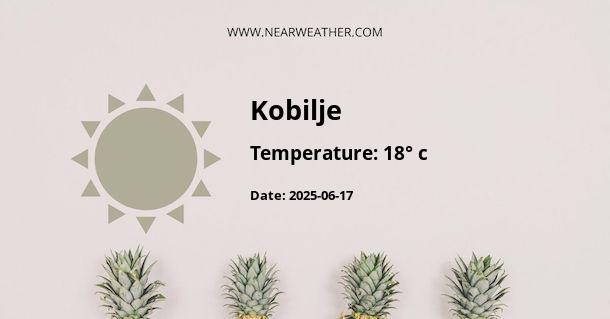Introduction to Kobilje, Slovenia
Kobilje is a settlement in the northeastern part of Slovenia, nestled within the region known as Prekmurje. It is characterized by its peaceful setting, diverse cultural heritage, and proximity to the Mura River, which plays an important role in the local ecosystem. The climate and weather in Kobilje reflect the transitional nature of the region, as Prekmurje often experiences a mixture of influences from the Mediterranean, continental, and even sub-pannonian climate zones. Understanding Kobilje's climate requires a deep dive into its seasonal variations, weather patterns, and climatic influences.
Climate Overview
In Kobilje, Slovenia, the climate can be classified as a humid continental climate, with significant influence from nearby geographical formations. The area experiences four distinct seasons:
- Spring: A transition period that typically brings increasing temperatures and precipitation levels.
- Summer: Characterized by warm to hot weather, with occasional heatwaves and thunderstorms.
- Autumn: A gradual cooling period which can display a full range of weather patterns from late summer warmth to early winter chill.
- Winter: Generally cold with snowfall, although milder winters are also possible.
Seasonal Weather Patterns
Spring
Spring in Kobilje begins with the melting of any residual winter snow and a gradual increase in average daily temperatures. Precipitation starts to increase, preparing the soil for the growing season.
"March heralds the coming of spring, while April's showers and May's warmth pave the way for full blossoming of nature."
Summer
The summers in Kobilje are typically warm, with July being the hottest month where temperatures can exceed 30°C (86°F). Thunderstorms are common, brought forth by the collision of warm, moist air with cooler atmospheric conditions.
"Long, lazy days of summer often climax with the dramatic light show of thunderstorms, providing relief from the heat."
Autumn
Autumn witnesses a colorful transformation in Kobilje's landscape with cooler temperatures and diminishing daylight. The weather in this period can be quite unpredictable.
"October's crisp air and golden hues give way to November's mist and chill, setting the stage for winter's arrival."
Winter
Winters are cold, with January usually being the coldest month, when temperatures can drop well below freezing. Snow is common, although accumulation can vary significantly from year to year.
"Winter's embrace brings both the hush of snow-covered landscapes and the brisk energy of icy mornings."
Average Temperature and Precipitation
Examining the average temperature along with the precipitation throughout the year provides insight into Kobilje's climate dynamics:
Temperature
| Month | Average High (°C) | Average Low (°C) |
|---|---|---|
| January | 2 | -5 |
| February | 5 | -3 |
| March | 10 | 1 |
| April | 16 | 6 |
| May | 21 | 11 |
| June | 24 | 14 |
| July | 27 | 16 |
| August | 26 | 16 |
| September | 21 | 12 |
| October | 15 | 7 |
| November | 8 | 2 |
| December | 3 | -3 |
Precipitation
| Month | Average Rainfall (mm) |
|---|---|
| January | 25 |
| February | 30 |
| March | 45 |
| April | 55 |
| May | 70 |
| June | 80 |
| July | 70 |
| August | 65 |
| September | 65 |
| October | 70 |
| November | 60 |
| December | 40 |
These numeric values indicate the typical climate patterns, though it must be noted that climate change can introduce variations and unpredictability into these historical averages.
Weather Extremes and Records
Kobilje, like many other regions, is subject to weather extremes. Record high temperatures in the summer seasons have sometimes surpassed 35°C (95°F), creating heatwaves that can impact human health and agricultural productivity. Conversely, winter can be severe, with record lows reaching -20°C (-4°F) or below, presenting challenges for infrastructure and daily life. Extreme weather events such as storms, heavy rainfall, or droughts are also part of the climatic challenges faced by this region.
Climatic Influences
Various factors influence the climate in Kobilje:
- The Alps to the west provide a rain shadow effect that can reduce precipitation levels.
- The Mura River can contribute to the humidity and fog, particularly in autumn and winter.
- Proximity to the Pannonian Basin can bring hotter, drier air, influencing summer temperatures.
- Seasonal winds, such as the cool Bora wind in winter, can influence temperature and weather patterns.
Implications of Climate Change
Climate change is expected to have significant impacts on the climate and weather conditions in Kobilje. Potential consequences include:
- Increased frequency and intensity of heatwaves in summer.
- Greater variability in precipitation, leading to both more intense rainfall events and periods of drought.
- Milder winters, with decreased snowfall that affects winter sports and local ecosystems.
- A shift in agricultural planting and harvesting seasons.
- Higher stress on water resources, especially during the summer months.
It is essential to monitor and adapt to these changes to mitigate their impact on the local environment, economy, and daily life in Kobilje.
Conclusion
The climate and weather in Kobilje offer a diverse tapestry of conditions that reflect the complex interplay of geographical, seasonal, and climate change influences. From warm, sunny summers to crisp, snowy winters, the seasonal rhythms of Kobilje are central to the cultural and economic life in this Slovenian community. As the world faces the challenges of climate change, understanding and adapting to Kobilje's meteorological realities will be increasingly important for its residents and stakeholders.
A - Kobilje's Latitude is 46.684719 & Longitude is 16.397779.
A - Weather in Kobilje is 8° today.
A - Climate Conditions in Kobilje shows broken clouds today.
A - Humidity in Kobilje is 59% today.
A - Wind speed in Kobilje is 4.18 km/h, flowing at 171° wind direction. today.
